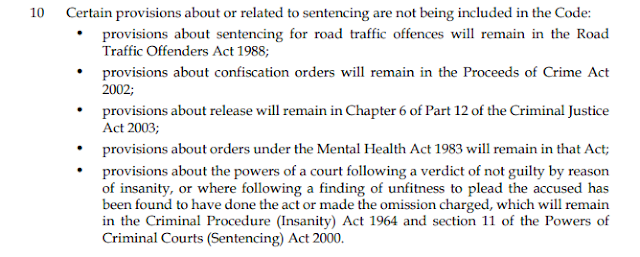Sentencing Council - 22 July 2020 and Sentencing offenders with mental disorders, developmental disorders, or neurological impairments
The following is a very brief
overview. It will be crucial for those working within the criminal justice system to be fully familiar with these guidelines and to be aware of the local availability of some orders - e.g. Community Orders with particular requirements such as Mental Health Treatment Requirements (MHTS), Alcohol Treatment Requirements (ATR), Drug Rehabilitation Requirements (DRR).
There will also be a need to focus on reports required for sentencing purposes in order to obtain confirmation of any mental disorder or impairment and to determine whether there was a link between that and the offending and, if so, what that connection was.
Section 1 General Approach - This guideline applies when sentencing offenders who at the time of the offence and/or at the time of sentencing have any mental disorder, neurological impairment or developmental disorder, such as those listed within Annex A.
The fact that an offender has an impairment or disorder should always be considered by the court but will not necessarily have an impact on sentencing.
There are a wide range of mental disorders, neurological impairments and developmental disorders and the level of any impairment will vary between individuals. Accordingly, in assessing whether the impairment or disorder has any impact on sentencing, the approach to sentencing should be individualistic and focused on the issues in the case.
Section 2 Assessing culpability - Culpability may be reduced if an offender was at the time of the offence suffering from an impairment or disorder (or combination of impairments or disorders) such as those listed in Annex A. The sentencer should make an initial assessment of culpability in accordance with any relevant offence-specific guideline, and should then consider whether culpability was reduced by reason of the impairment or disorder. Culpability will only be reduced if there is sufficient connection between the offender’s impairment or disorder and the offending behaviour.
Section 3 Determining the sentence -impairments or disorders may be relevant to the decision about the type of sentence imposed, in particular a disposal under powers contained in the Mental Health Act 1983. Also, Impairments or disorders may be relevant to an assessment of whether the offender is dangerous as that term is defined for sentencing purposes in Chapter 5 of Part 12 of the Criminal Justice Act 2003.
Annex A - Main classes of mental disorders and presenting features
Annex B - Reports - it is likely that reports will be required in cases where there are concerns about impairments or disorders.
The Council draws attention to the form ‘Directions for Commissioning a Psychiatric or other medical report for sentencing purposes’, rule 28.8, regarding commissioning a medical report.
Courts may need to seek information on issues such as:
- how the condition relates to the offences committed,
- the level of impairment due to the condition at the time of the offence and currently,
- if there has been a failure of compliance (e.g. not attending appointments, failing to take prescribed medication) what is thought to be driving that behaviour,
- if a particular disposal is recommended, the expected length of time that might be required for treatment, and details of the regime on release/post release supervision,
- any communication difficulties and/or requirement for an intermediary.
Annex C - Sentencing disposals: criteria and release provisions.
: The Sentencing (Pre-consolidation Amendments) Act 2020 and the Sentencing Bill :
As a first step to consolidation of sentencing law, Parliament has enacted the Sentencing (Pre-consolidation Amendments) Act 2020
A second step is the lengthy Sentencing Bill currently proceeding through Parliament.
The purpose of the Sentencing (Pre-consolidation Amendments) Act is to amend existing legislation so as to facilitate the enactment and operation of a Sentencing Code proposed by the Law Commission.
The Code is to be a consolidation of legislation governing sentencing procedure. At present, the law about sentencing is spread across numerous Acts of Parliament and this makes sentencing in many cases a difficult exercise and also makes it prone to errors. When the Code is in force, there will be (almost) a single point of reference - the Code.
Subject to some limited exceptions, there is to be a so-called "clean sweep" so that all offenders convicted after the Code comes into force will be sentenced according to the most up to date law irrespective of when they committed the offence.
Neither the Bill nor the Code
introduce any new sentencing law. They do not alter the maximum
penalties available for an offence or increase the scope of minimum
sentencing provisions.
Drafter's Notes (21 July 2020) indicate some matters that will not be in the Code -
For further information about the Code see - Martin Partington's blog - Enacting the sentencing code
Drafter's Notes (21 July 2020) indicate some matters that will not be in the Code -
For further information about the Code see - Martin Partington's blog - Enacting the sentencing code






No comments:
Post a Comment